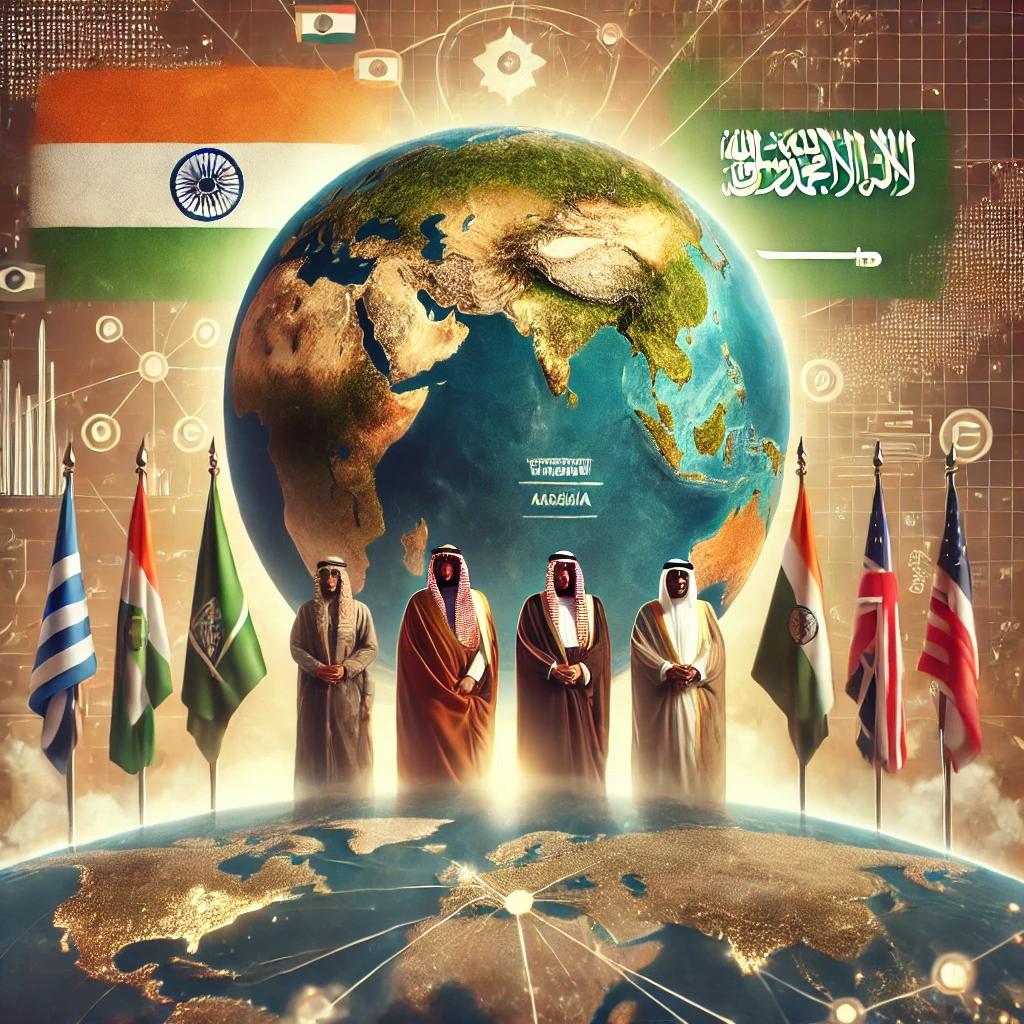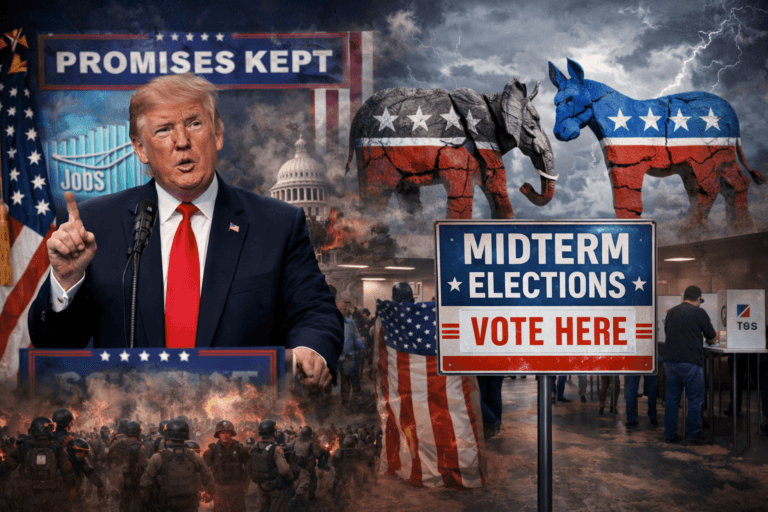The Multipolar World: How Swing States Like India and Brazil Are Shaping Global Power Shifts and Redefining International Influence in the New World Order

Introduction: The New Landscape of Global Power
The modern geopolitical arena is undergoing a significant transformation, characterized by the emergence of a multipolar world. This concept refers to an international system where multiple states hold significant power, rather than being dominated by a single superpower or a binary conflict between two key players. Within this newly distributed power structure, ‘swing states’ have risen to prominence. In a geopolitical context, swing states are nations whose strategic choices and alliances can significantly influence global power dynamics.
Countries such as India, Saudi Arabia, and Brazil are at the forefront of this shift. Their increasing influence on the global stage is reshaping the traditional balance of power, and their diplomatic maneuvers are pivotal in the current international landscape. These nations are not merely passive players but active agents capable of swaying major geopolitical outcomes in various directions.
The prominence of these swing states has become particularly evident in 2024, due to a series of recent geopolitical events and trends. For instance, economic developments, strategic partnerships, and regional conflicts have underscored the critical roles that India, Saudi Arabia, and Brazil play in global affairs. Additionally, shifts in global trade patterns, technological advancements, and collective security arrangements have further accentuated the importance of these countries.
As traditional superpowers grapple with internal and external challenges, the rise of swing states is not only inevitable but also transformative. Their strategic decisions regarding alliances, economic policies, and diplomatic engagements are influencing global power structures in unprecedented ways. Understanding the evolving roles of these countries within a multipolar world is crucial for comprehending the contemporary dynamics of international relations.
India’s Role: A Balancing Act in Asia
India stands at a strategic crossroads in Asia, navigating its path between the influences of major global powers such as the United States, China, and Russia. As a rising power itself, India’s foreign policy is characterized by a nuanced balancing act, aiming to bolster its own influence on the global stage while maintaining amicable relations with these major entities.
India’s relationship with the United States has grown significantly in recent years, highlighted by robust diplomatic exchanges and expanding defense and economic ties. The bilateral trade between the two nations exceeded $146 billion in 2019, showcasing a deepening economic interdependence. Furthermore, defense agreements like the Logistics Exchange Memorandum of Agreement (LEMOA) have enhanced military cooperation, adding a strategic dimension to their partnership.
Simultaneously, India’s stance towards China is complex, driven by competitive and cooperative dynamics. Border disputes and economic competition mark the contentious aspects of their relationship. Nonetheless, trade between the two nations remains substantial, with China being one of India’s largest trading partners. Despite the friction, India participates actively in multilateral forums such as the BRICS, where it collaborates with China on broader economic and development initiatives.
In its interactions with Russia, India continues to maintain a cordial relationship rooted in historical ties and military cooperation. Russia remains a critical supplier of defense equipment to India, underscoring their sustained strategic partnership. Additionally, their collaboration in fields such as nuclear energy and space technology further cements this enduring bond.
India’s involvement in international organizations also plays a pivotal role in its strategic diplomacy. Its proactive participation in the Quad alliance, which includes the United States, Japan, and Australia, underscores its commitment to a balanced strategic approach in the Indo-Pacific region. Moreover, India’s role in the United Nations and other global institutions enhances its stature as a significant global player, contributing to peacekeeping efforts and international policy-making processes.
Through these multifaceted diplomatic maneuvers, trade agreements, and strategic alliances, India adeptly leverages its relationships with major powers to amplify its influence, thereby redefining its role as a pivotal swing state in the evolving multipolar world order.
Saudi Arabia: The Middle Eastern Power Broker
Saudi Arabia stands as a pivotal player in the Middle East and on the global stage due to its vast oil reserves and strategic geopolitical positioning. The kingdom has long maintained a complex web of alliances and rivalries that influence its actions in the region and beyond. Foremost among its strategic partnerships is its longstanding alliance with the United States, a relationship rooted in mutual economic and security interests. This partnership has manifested in extensive military cooperation and substantial American arms sales to Saudi Arabia, bolstering its defense capabilities considerably.
Rivalry with Iran is another significant factor shaping Saudi Arabia’s foreign policy. The Sunni-majority kingdom perceives the Shia-majority Iran as a regional adversary, influencing conflicts and power struggles throughout the Gulf region. This enmity plays out prominently in proxy wars, such as those in Yemen and Syria, where Saudi and Iranian-backed forces are in contention. The kingdom’s relationships with neighboring countries such as Qatar and the United Arab Emirates also embody intricate dynamics, marked by both cooperation and competition.
On the economic front, Saudi Arabia is actively aiming to reduce its dependence on oil through its ambitious Vision 2030 initiative, spearheaded by Crown Prince Mohammed bin Salman. Vision 2030 encompasses wide-ranging reforms aimed at diversifying the economy, fostering innovation, and attracting foreign investment. By positioning itself as a hub for business, tourism, and technology, Saudi Arabia seeks to create a more sustainable economic model for the future. Nonetheless, its oil wealth continues to afford Saudi Arabia substantial leverage in global politics.
Balancing traditional alliances with burgeoning new partnerships is crucial for Saudi Arabia amid recent geopolitical shifts. The kingdom has increasingly engaged with countries like China and Russia, reflecting a multipolar approach to international relations. This diplomatic diversification not only aids in building a more robust global presence but also ensures that Saudi Arabia remains a central player amidst evolving global power dynamics.
Brazil: Latin America’s Emerging Power
Brazil, often described as the “sleeping giant” of Latin America, is increasingly defining its role on the global stage. Boasting the largest economy in South America, Brazil’s economic potential is fueled by diverse and abundant natural resources, including vast agricultural lands, extensive mineral deposits, and the Amazon rainforest. As a member of Mercosur—an economic and political bloc that includes Argentina, Uruguay, and Paraguay—Brazil exerts significant influence over regional economic policies and trade agreements. The country’s leadership within Mercosur underscores its commitment to regional cooperation and economic integration.
The foundation of Brazil’s burgeoning influence rests on its economic prowess. As an emerging market, Brazil has cultivated a robust industrial sector and is a leading exporter of commodities such as soybeans, coffee, and oil. This economic strength allows Brazil to engage more assertively in international trade and diplomatic relations. Brazil’s foreign policy is marked by a pragmatic approach, balancing its relationships with major global powers such as the United States, China, and Europe. Through trade partnerships and strategic alliances, Brazil seeks to enhance its global standing while fostering sustainable development within its borders.
In recent years, Brazil has adopted a multifaceted foreign policy strategy, navigating the complexities of geopolitics with finesse. Its relationship with the United States, though historically oscillating, remains pivotal. Engagements with the US span various sectors, including trade, military cooperation, and environmental conservation. Meanwhile, Brazil’s ties with China have strengthened through substantial investments and trade exchanges, making China Brazil’s largest trading partner. The European Union also remains a key ally, with Brazil actively seeking to finalize comprehensive trade agreements to bolster economic growth and technological advancements.
Besides fostering bilateral relations, Brazil actively participates in international forums and organizations. It is a vocal advocate for reforming institutions like the United Nations to better represent the interests of developing countries. As a member of BRICS (Brazil, Russia, India, China, and South Africa), Brazil champions the cause of emerging economies, underscoring its leadership role within this coalition.
Brazil’s ascent on the global stage is anchored by its pursuit of multilateralism and regional leadership. By leveraging its economic, political, and cultural capital, Brazil is carving out its position as a pivotal player in the evolving multipolar world order.
The Implications of Multipolarity for Global Governance
The transformation from a unipolar to a multipolar world has significant implications for global governance. The rise of multiple influential states diversifies the centers of power, presenting both challenges and opportunities for international organizations such as the United Nations (UN), World Trade Organization (WTO), and International Monetary Fund (IMF). This shift necessitates a reassessment of governance frameworks that were predominantly structured around a few superpowers.
One of the main challenges of multipolarity is the increased complexity in decision-making processes within international bodies. With more influential states having a stake in global affairs, reaching consensus on key issues can become more arduous. This dynamic often leads to protracted negotiations, diluting the efficacy of these institutions. For instance, the UN Security Council could face gridlock more frequently as emerging powers assert their interests, which may not align with those of the traditional superpowers.
Conversely, this new geopolitical landscape also creates opportunities for more inclusive and representative governance. The voices of previously marginalized or less influential states are now amplified, fostering a more democratic international dialogue. The emergence of swing states—nations that do not align strictly with any one power bloc—has empowered these countries to broker deals and mediate conflicts, thereby contributing to a more balanced global order.
Swing states can leverage their unique positions to create new alliances and blocs, thereby disrupting conventional power structures. These alternative coalitions, such as the BRICS group (Brazil, Russia, India, China, and South Africa), advocate for governance models that emphasize equitable and sustainable development. Such initiatives challenge the status quo and push for reforms that consider diverse perspectives, reducing the domination of traditional superpowers.
Moreover, these new power alignments can lead to innovative approaches in tackling global issues such as climate change, trade imbalances, and financial instability. As swing states collaborate with both traditional powers and other rising nations, they can introduce and champion policies that promote greater global cooperation and resilience.
While the move toward multipolarity presents challenges, its implications for global governance are profound, urging international organizations to adapt and innovate. The increasing influence of swing states holds the potential to democratize global decision-making processes, underlining the necessity for a more inclusive and adaptable governance framework.
Diplomatic Strategies in a Multipolar World
In an increasingly multipolar world, swing states deploy a variety of diplomatic strategies to maneuver through the intricate web of international relations. As the global landscape becomes more complex and multi-faceted, countries like India, Saudi Arabia, and Brazil have developed adept approaches to enhance their geopolitical influence and secure their national interests.
One primary strategy employed by these nations is leveraging multilateral forums. India, for instance, actively participates in high-profile international organizations such as the United Nations, BRICS (Brazil, Russia, India, China, and South Africa), and the G20. By being active members of these groups, India can influence global economic policies, promote its stance on vital issues such as climate change, and advocate for reforms in international governance structures to better reflect contemporary realities.
Furthermore, bilateral negotiations are a key element in swing states’ diplomatic arsenal. Saudi Arabia has pursued numerous bilateral agreements to diversify its alliances and economic ties. The country has enhanced its partnerships with both Western powers, like the United States, and Eastern giants, such as China and India. This diversification enables Saudi Arabia to mitigate risks associated with over-reliance on a single partner and to navigate geopolitical shifts with greater flexibility.
Trade deals also play a critical role in the diplomatic repertoire. Brazil, as a leading member of MERCOSUR (Southern Common Market), has utilized trade agreements to bolster its economy and to strengthen its diplomatic links with regional neighbors and international powers. By securing favorable trade terms and engaging in commerce with a variety of countries, Brazil can pursue economic growth while simultaneously advancing its foreign policy objectives.
Military alliances constitute another vital strategy. Countries like India have forged defense collaborations with nations such as the United States, Japan, and Australia through frameworks like the Quadrilateral Security Dialogue (Quad). These alliances not only enhance military capabilities but also serve as a deterrence against common threats, thus ensuring regional stability and security.
Lastly, soft power is increasingly significant in a multipolar world. Cultural diplomacy, foreign aid, and international co-operation in education and technology are tools used by swing states to project influence. For example, Brazil’s cultural diplomacy, through initiatives like the Lusophone Commonwealth, enhances its soft power by promoting the Portuguese language and culture across various continents.
Through these multifaceted diplomatic strategies, swing states adeptly navigate the complexities of a multipolar world, securing their national interests while amplifying their global stature.
The Economic Impact of Swing States
The evolving economic landscape of swing states is having profound implications for global markets and trade patterns. These countries, buoyed by rapidly growing economies, are not just participants but active shapers of global economic frameworks. Economies such as India, Brazil, and Indonesia are now integral players in sectors like technology, agriculture, and energy, thus positioning themselves as pivotal actors within the international economic arena.
One of the remarkable indicators of their influence is the increasing trend in trade agreements orchestrated by these swing states. By forging bilateral and multilateral trade deals, these nations open new avenues for market access, thereby diversifying their economic partnerships and reducing reliance on traditional powerhouses. This strategic move underscores their intent to establish more dynamic and balanced trade ecosystems. For instance, the Comprehensive Economic Partnership Agreement between India and Japan marks a significant leap towards consolidating regional economic might.
Investment flows into and out of these countries further illustrate their crucial role. Foreign Direct Investment (FDI) has seen a robust uptick as global investors recognize the potential of these burgeoning markets. Conversely, these economies are also becoming substantial investors abroad. Brazilian investments in African mining, for example, have catalyzed significant development, fostering bonds that extend beyond mere economic interests and touch upon social and technological advancements.
Evidently, economic diplomacy has become a powerful tool wielded by swing states. Through initiatives such as the Belt and Road Initiative led by China, these countries are not only securing essential trade routes and resources but are also extending their geopolitical influence. Economic diplomacy allows these nations to leverage their economic clout for strategic gains, compelling larger powers to recalibrate their approaches.
In specialized sectors, swing states are becoming global leaders. India’s tech industry, Brazil’s agricultural prowess, and South Africa’s mining sector exemplify how these nations are setting benchmarks and driving innovations that resonate globally. Their ascendance in these areas not only contributes to their economic heft but also translates into significant geopolitical influence, reshaping the very contours of global power dynamics.
Future Projections: The Long-Term Impact of Multipolarity
As the world continues to shift from unipolarity towards a multipolar framework, the long-term implications of this transition are substantial and multifaceted. The rise of multiple global power centers is poised to reshape international relations, potentially ushering in a more complex but balanced global order. In the foreseeable future, power dynamics could evolve in several ways, each carrying unique implications for international stability, conflict, and cooperation.
One potential scenario is a world where regional powers become more influential, leading to a decentralization of authority that challenges traditional superpowers. This dispersion of power may result in increased regional stability as local leaders exert greater control over their areas of influence. However, it may also lead to regional conflicts as these powers jostle for dominance. The balance between cooperation and competition will be delicate, requiring adept diplomacy and robust international frameworks.
For established superpowers, adapting to a multipolar world will necessitate reevaluating foreign policies and forging new alliances. These countries will need to shift from unilateral decision-making to more collaborative approaches, embracing multilateralism to maintain their influence. This approach could promote global stability, but it also demands significant diplomatic agility and willingness to negotiate compromises.
Smaller nations, in this context, might find new opportunities and challenges. On one hand, they could leverage their strategic positions to negotiate better terms with multiple powers, potentially gaining more autonomy and economic benefits. On the other hand, they may face increased pressure to align with one bloc over another, risking their sovereignty and internal stability.
International organizations will play a crucial role in navigating this multipolar landscape. Strengthening institutions like the United Nations and enhancing regional cooperation mechanisms will be vital in managing conflicts and fostering global cooperation. For global citizens, understanding the nuances of multipolarity and advocating for responsible governance will be essential in promoting peace and prosperity.
Overall, as this multipolar world continues to unfold, it will require a concerted effort from countries, international bodies, and individuals alike to adapt and thrive. The evolving power dynamics present both opportunities and risks, emphasizing the need for innovative strategies and resilient diplomacy to ensure a stable and cooperative global future.


